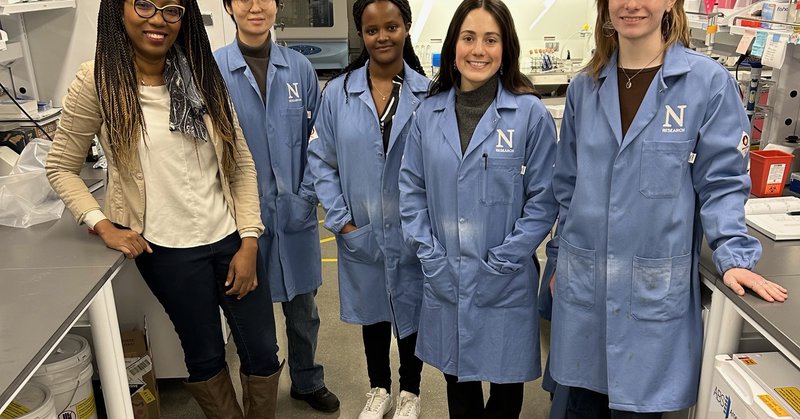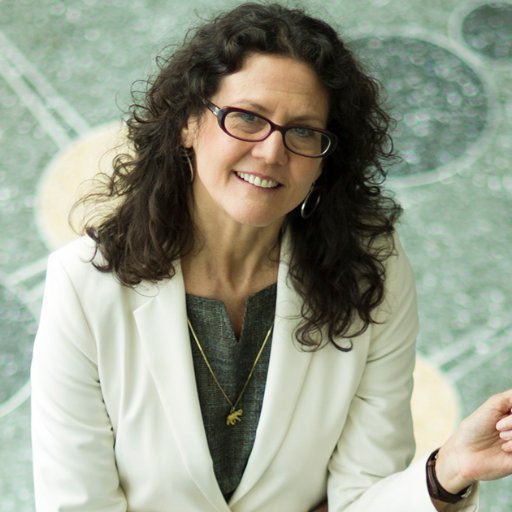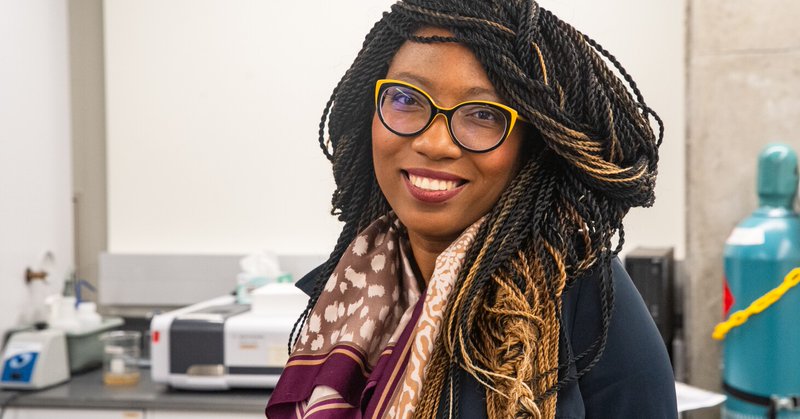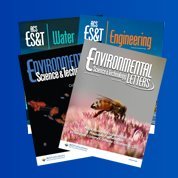
Aristilde Lab @ Northwestern Engineering
@AristildeLab
Followers
822
Following
920
Media
65
Statuses
341
Studying Mechanisms of Environmental Organic Processes, #Metabolomics #Biogeochemistry #Biotechnology, Dr. Ludmilla Aristilde #BlkInEngineering #BlkinGeoscience
Evanston, IL
Joined August 2020
Curious about how certain soils can retain moisture for a long time? Checkout recent @AristildeLab article in @PNASNexus on how organic matter facilitates trapping of water in soil mineral nanopores. Funded by @NSF @IINanoNU .Article link:
0
0
4
RT @NorthwesternU: In this period of uncertainty, the University will fund research that is subject to stop-work orders or the federal fund….
0
183
0
#Pseudomonas putida preprint alert: We provide a quantitative blueprint of #carbon and #energy fluxes in the native metabolism of #lignin aromatics: ferulate, coumarate, vanillate, and hydroxybenzoate.
0
0
1
RT @NorthwesternEng: Concrete is a climate problem, and this breakthrough could help fix it. Professors Alessandro Rotta Loria and Jeffrey….
0
1
0
How fast and how efficient can iron oxides catalyze phosphate cleavage from ribonucleotides? See our latest pub in @EnvSciTech on rates and turnover numbers for #enzyme-like reaction by #iron oxides, natural mineral #catalysts. Funded by @ENERGY @IINanoNU .
pubs.acs.org
Iron oxides, which are documented phosphorus (P) sinks as adsorbents, have been shown to catalyze organic P dephosphorylation, implicating these minerals as catalytic traps in P cycling. However,...
0
0
6
@AristildeLab featured in the Daily Northwestern. #plastics #bacteria #soul #nutrients . @cee_nwu . @NUSynBio .
dailynorthwestern.com
From discovering plastic-eating bacterium to finding a new catalytic process in soils, the Aristilde Research Group had a busy year in 2024. It published seven papers and submitted four more for...
0
1
8
A worthy read!.
Today I’m joining 30+ colleagues in taking an unusual step: calling for a halt to a line of research I was excited about, the long-term effort to build “mirror life”. We’re sharing our findings in a @ScienceMagazine paper:. 1/6.
0
0
2
Official cover #MyACSCover of @AristildeLab publication on #enzyme mechanisms by #plastics-eating wastewater bacteria in ES&T @EnvSciTech. Article link: Led by postdocs Dr Rebecca Wilkes and Dr Nanqing Zhou. @NSF funded @NUSynBio @NorthwesternEng @cee_nwu
3
5
36
Northwestern Center for Synthetic Biology @NUSynBio highlights recent article in Chicago Sun Times @Suntimes on @AristildeLab research.
Growing up in Haiti, @AristildeLab saw the effects of environmental disasters. Now, she’s leading a team harnessing microbes to break down plastics in rivers. Join the fight for a sustainable future!🌱 #Sustainability #Innovation
0
3
18
Article in Chicago Sun Times @SunTimes covers @AristildeLab research on plastic-eating #bacteria, #plastic pollution, discussions with Prof Aristilde as a #Haitian-American scholar navigating life inside and outside of #academia. @NorthwesternU @NUSynBio.
chicago.suntimes.com
“We can learn from nature to engineer sustainable solutions," says Ludmilla Aristilde, who led a scientific team identifying how to eliminate the tiniest pieces of plastic from waterways.
2
7
40
Official announcement!.
.@AristildeLab of @cee_nwu @NorthwesternEng @NorthwesternU demonstrate that C. testosteroni constitutively produces a #Hydrolase that can facilitate hydrolysis of #PolyethyleneTerephthalate oligomers & the fragmentation of PET pellets. #OpenAccess ES&T:
0
1
13
RT @TwistBioscience: Comamonas testosteroni can digest PET plastic, and a key enzyme responsible for breaking down the plastic materials ha….
futurism.com
The scientists edited to the bacteria to prove which enzyme it used to degrade PET plastics into bioavailable carbon.
0
1
0
Check out @NorthwesternEng feature on @AristildeLab research published yesterday in @EnvSciTech on #plastic-eating enzymes identified in a #wastewater #bacterium.
Professor Ludmilla Aristilde’s discovery of how cells of a Comamonas bacterium break down plastic for food opens new possibilities for developing bacteria-based engineering solutions to help clean up difficult-to-remove plastic waste.
0
2
15
Northwestern News covers new @AristildeLab research published in @EnvSciTech on mechanisms and enzymes used by a #wastewater #bacterium to break down #plastics and use it as a food source. See link: @NorthwesternU @NorthwesternEng @NUSynBio @cee_nwu @NSF
1
4
25
Can wastewater bacteria provide solutions to the plastics problem? Just out today new @AristildeLab study unraveling how #wastewater Comamonas #bacteria break down PET #plastics into #nanoplastics and ultimately digestible #carbons.
pubs.acs.org
Comamonadaceae bacteria are enriched on poly(ethylene terephthalate) (PET) microplastics in wastewaters and urban rivers, but the PET-degrading mechanisms remain unclear. Here, we investigated these...
0
13
66



















